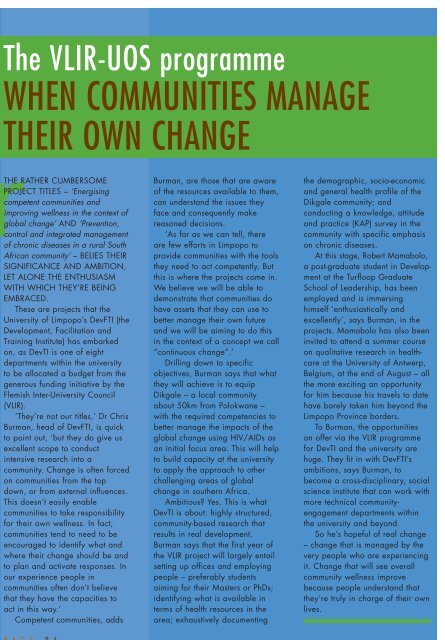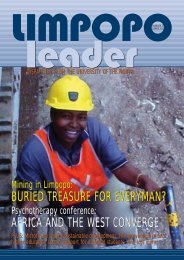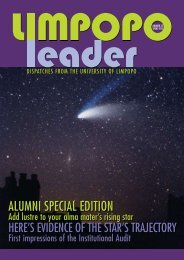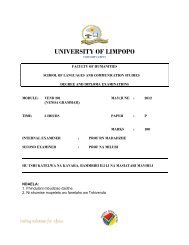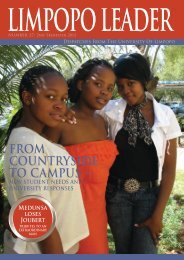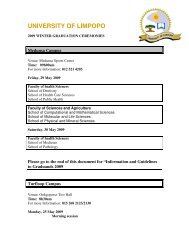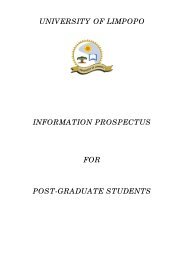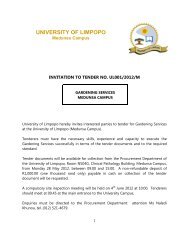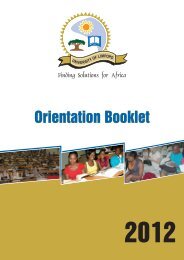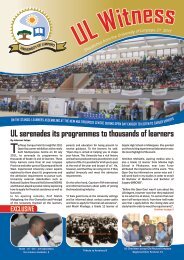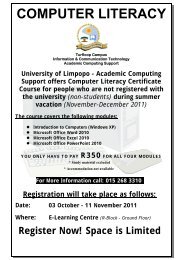MEDUNSA UPGRADE - University of Limpopo
MEDUNSA UPGRADE - University of Limpopo
MEDUNSA UPGRADE - University of Limpopo
Create successful ePaper yourself
Turn your PDF publications into a flip-book with our unique Google optimized e-Paper software.
The VLIR-UOS programme<br />
WHEN COMMUNITIES MANAGE<br />
THEIR OWN CHANGE<br />
rTHE RATHER CUMBERSOME<br />
PROJECT TITLES – ‘Energising<br />
competent communities and<br />
improving wellness in the context <strong>of</strong><br />
global change’ AND ‘Prevention,<br />
control and integrated management<br />
<strong>of</strong> chronic diseases in a rural South<br />
African community’ – BELIES THEIR<br />
SIGNIFICANCE AND AMBITION,<br />
LET ALONE THE ENTHUSIASM<br />
WITH WHICH THEY’RE BEING<br />
EMBRACED.<br />
These are projects that the<br />
<strong>University</strong> <strong>of</strong> <strong>Limpopo</strong>’s DevFTI (the<br />
Development, Facilitation and<br />
Training Institute) has embarked<br />
on, as DevTI is one <strong>of</strong> eight<br />
departments within the university<br />
to be allocated a budget from the<br />
generous funding initiative by the<br />
Flemish Inter-<strong>University</strong> Council<br />
(VLIR).<br />
‘They’re not our titles,’ Dr Chris<br />
Burman, head <strong>of</strong> DevFTI, is quick<br />
to point out, ‘but they do give us<br />
excellent scope to conduct<br />
intensive research into a<br />
community. Change is <strong>of</strong>ten forced<br />
on communities from the top<br />
down, or from external influences.<br />
This doesn’t easily enable<br />
communities to take responsibility<br />
for their own wellness. In fact,<br />
communities tend to need to be<br />
encouraged to identify what and<br />
where their change should be and<br />
to plan and activate responses. In<br />
our experience people in<br />
communities <strong>of</strong>ten don’t believe<br />
that they have the capacities to<br />
act in this way.’<br />
Competent communities, adds<br />
P A G E 2 6<br />
Burman, are those that are aware<br />
<strong>of</strong> the resources available to them,<br />
can understand the issues they<br />
face and consequently make<br />
reasoned decisions.<br />
‘As far as we can tell, there<br />
are few efforts in <strong>Limpopo</strong> to<br />
provide communities with the tools<br />
they need to act competently. But<br />
this is where the projects come in.<br />
We believe we will be able to<br />
demonstrate that communities do<br />
have assets that they can use to<br />
better manage their own future<br />
and we will be aiming to do this<br />
in the context <strong>of</strong> a concept we call<br />
“continuous change”.’<br />
Drilling down to specific<br />
objectives, Burman says that what<br />
they will achieve is to equip<br />
Dikgale – a local community<br />
about 50km from Polokwane –<br />
with the required competencies to<br />
better manage the impacts <strong>of</strong> the<br />
global change using HIV/AIDs as<br />
an initial focus area. This will help<br />
to build capacity at the university<br />
to apply the approach to other<br />
challenging areas <strong>of</strong> global<br />
change in southern Africa.<br />
Ambitious? Yes. This is what<br />
DevTI is about: highly structured,<br />
community-based research that<br />
results in real development.<br />
Burman says that the first year <strong>of</strong><br />
the VLIR project will largely entail<br />
setting up <strong>of</strong>fices and employing<br />
people – preferably students<br />
aiming for their Masters or PhDs;<br />
identifying what is available in<br />
terms <strong>of</strong> health resources in the<br />
area; exhaustively documenting<br />
the demographic, socio-economic<br />
and general health pr<strong>of</strong>ile <strong>of</strong> the<br />
Dikgale community; and<br />
conducting a knowledge, attitude<br />
and practice (KAP) survey in the<br />
community with specific emphasis<br />
on chronic diseases.<br />
At this stage, Robert Mamabolo,<br />
a post-graduate student in Development<br />
at the Turfloop Graduate<br />
School <strong>of</strong> Leadership, has been<br />
employed and is immersing<br />
himself ‘enthusiastically and<br />
excellently’, says Burman, in the<br />
projects. Mamabolo has also been<br />
invited to attend a summer course<br />
on qualitative research in healthcare<br />
at the <strong>University</strong> <strong>of</strong> Antwerp,<br />
Belgium, at the end <strong>of</strong> August – all<br />
the more exciting an opportunity<br />
for him because his travels to date<br />
have barely taken him beyond the<br />
<strong>Limpopo</strong> Province borders.<br />
To Burman, the opportunities<br />
on <strong>of</strong>fer via the VLIR programme<br />
for DevTI and the university are<br />
huge. They fit in with DevFTI’s<br />
ambitions, says Burman, to<br />
become a cross-disciplinary, social<br />
science institute that can work with<br />
more technical communityengagement<br />
departments within<br />
the university and beyond.<br />
So he’s hopeful <strong>of</strong> real change<br />
– change that is managed by the<br />
very people who are experiencing<br />
it. Change that will see overall<br />
community wellness improve<br />
because people understand that<br />
they’re truly in charge <strong>of</strong> their own<br />
lives.


